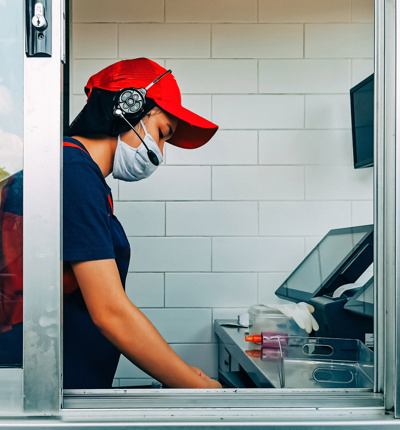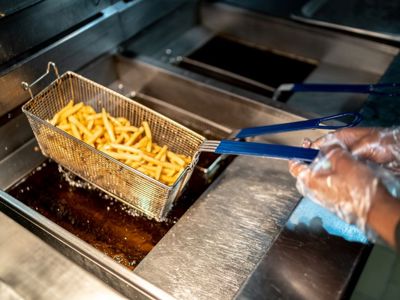
McDonald's claim Q&A
Find out more information on the McDonald's claim.
More than a year after we started this claim, the BBC has found that young staff at McDonald's are still facing sexual abuse and harassment despite the CEO telling MPs that safeguarding had been strengthened.
The BBC also reported that a further 300 people have been in touch with the Equality Human Rights Commission since their original investigation in 2023 and that the Commission has been forced to intervene again.
Some of our clients have shared their experiences. You can read our full article here.
Q&A’s – Leigh Day Claims against McDonald’s
These claims are about discrimination and working in an unsafe working environment. They are based on information we have been told by our clients, that which is in the public domain. We understand that employees working in McDonald’s restaurants are likely to be exposed to an unsafe working environment, which in turn has led to the creation of a culture which sees younger employees rarely speaking out about the unwanted treatment they have received or if they do speak out, of not having their concerns properly addressed.
From what we have seen and heard so far, we are of the view that McDonald’s may have acted unlawfully by not taking appropriate and necessary steps to ensure a safe working environment for their younger employees – making them vulnerable to discrimination and/or harassment which is a key example of an unsafe working environment.
If we are correct in our assessment and successful in the claim, we are looking to obtain compensation on behalf of our clients. We anticipate such compensation will be made up of an award for injury to feelings and any proven applicable associated financial losses.
We are bringing this claim in the Employment Tribunal on behalf of current and former McDonald’s employees who worked in any McDonald’s restaurants in England, Wales and Scotland. This is a group claim, which means there could potentially be a very large number of people joining the claim.
In order to be eligible to join the claim your circumstances will fit into either (a) or (b) below, either:
(a) You are currently employed by McDonald’s and are 19 years of age or younger;
or
(b) You are no longer employed by McDonald’s but you were employed at some point in time after July 2019, and you were 19 years of age or younger on your last day of employment.
Please note there are some further eligibility criteria and if you no longer work at McDonald’s and these are explained in the questionnaire.
You must complete the online questionnaire part 1 and part 2.
Questionnaire
(1) Part 1 asks you questions about your personal information and employment.
If you are not eligible to bring a claim based on your answers to the questionnaire, a message will appear on the screen to inform you of this. If you are eligible, you will be put through to Part 2 of the questionnaire.
(2) Part 2 will take you to our Client Care and Costs Letter and Damages Based Agreement (which is commonly known as a “no win, no fee”), which you will need to read and confirm you agree with.
Once you have completed all of the above, you will become a client of Leigh Day, subject to our necessary checks, and we will be in contact regarding the next steps.
To ensure that you can access justice without worrying how you will pay for it, we will fund this case under a ‘DBA’. DBA stands for Damage Based Agreement and is more commonly known as a “no win no fee”. What this means for us is that we share the risk of the litigation with you because we only get paid for our work if you win your case, and because we are sharing the risk with you, it also means that if your case is lost you will not have to pay anything towards our fees (provided you do not breach the terms of the agreement).
Put simply – if we lose, you do not pay. And if we win, you pay us out of the compensation we recover on your behalf.
When you sign up to join this claim you will be shown the DBA, along with a helpful explainer, but be assured if you sign up to join this claim you have the right to cancel your agreement with us at no cost to you, providing you do so within 14 days in accordance with the Damages Based Agreement.
This claim will be heard in the Employment Tribunal. The Employment Tribunal is different from other courts and has its own rules and procedures. Employment Tribunals are specialist tribunals, they deal only with employment law related and are expert in the world of work.
One of the special rules which the Employment Tribunal has compared to the other courts is that each side is responsible for their own costs whether they win or lose the case. It is only in a small number of cases that the Judge will order one side to pay the other side’s costs. Scenarios in which this may happen includes where one party acts unreasonably, or where the claim or defence has no reasonable prospect of success. This is stated in the Damages-Based Agreement.
It is possible that you can still join the claim if you have since left your employment with McDonald’s, but it is not guaranteed that you will be able to. Whether you can or not will depend on your individual circumstances. We will be able to provide you with more information once we have reviewed your answers to the questionnaire.
Yes, you can still bring a claim.
If you sign up to the claim and later end your employment with McDonald’s, please inform us straight away.
When completing the questionnaire please provide the details of the current or most recent restaurant you have worked at.
If we require any further information, we will be in contact with you directly regarding this.
Losing your job because you joined this claim would be unlawful. In fact any detrimental treatment you receive from McDonalds, including from your managers and colleagues because you joined this claim would be unlawful.
If you join this claim and notice that having done so, you are being treated badly in any way, please do let us know straight away.
As this a group claim, you are not alone. The law of victimisation is designed to protect you, and whilst it cannot stop things happening, it does in our experience act as a powerful deterrent.
Victimisation law means that there are likely to be serious consequences for anyone who is found to be acting negatively against someone because they joined the claim. And by acting negatively, we mean acting in a way which is detrimental to you, for example by taking away some of your shifts, by ignoring you, by trivialising the incident(s). The law around victimisation is an important legal protection for you. It is there to protect you from any negative actions you might face as a result of making an allegation of discrimination or harassment.
The law recognises the importance of creating a physically and psychologically safe and discrimination-free working environment for everyone and it does that by protecting employees who make an allegation of discrimination, or who participate in any discrimination-related investigation or proceedings, such as those who provide evidence of discrimination and those who offer support to those who support others who are making such an allegation.
Please see below further information in relation to the Employment Tribunal process and sharing of information.
Your employer will be aware that you have brought a claim as they will be required to respond to that claim, but remember this is a group claim. If you join this claim, you are one of many. You are not facing McDonalds alone.
To bring a Tribunal claim against McDonald’s your information will have to be shared with them and their legal team. We will also have to share your information with ACAS (Advisory, Conciliation and Arbitration Service) and the Employment Tribunal itself. We may also discuss details with our barristers, academic professionals and payment companies. We will ensure that robust confidentiality agreements are in place with those who we share your information with.
Join the claim

McDonald's staff subject to sexual harassment in a toxic workplace, according to BBC investigation
More than 100 current and recent McDonald’s workers have told the BBC about a toxic culture of sexual assault, harassment, racism and bullying at the fast-food restaurants’ UK outlets.



